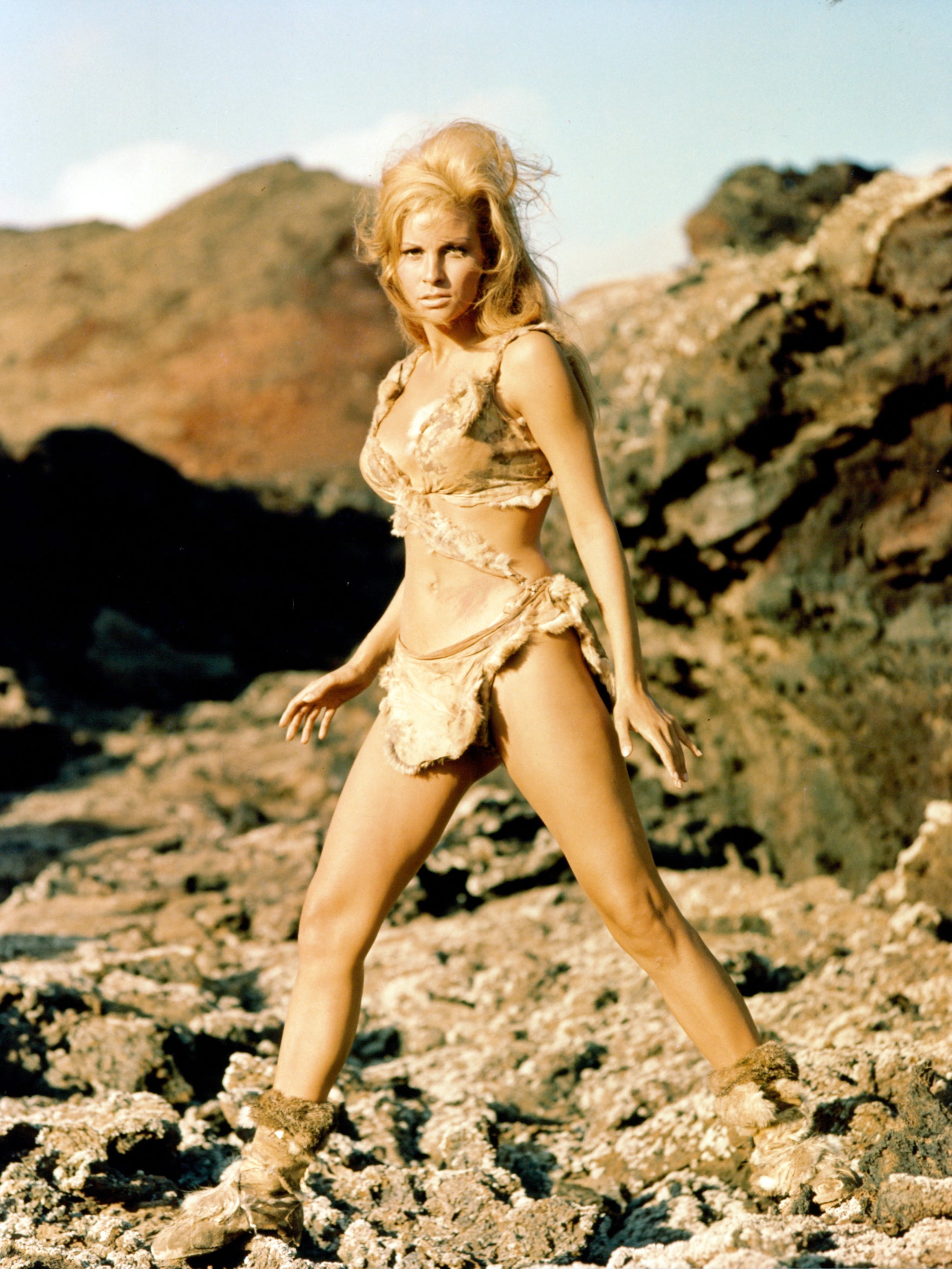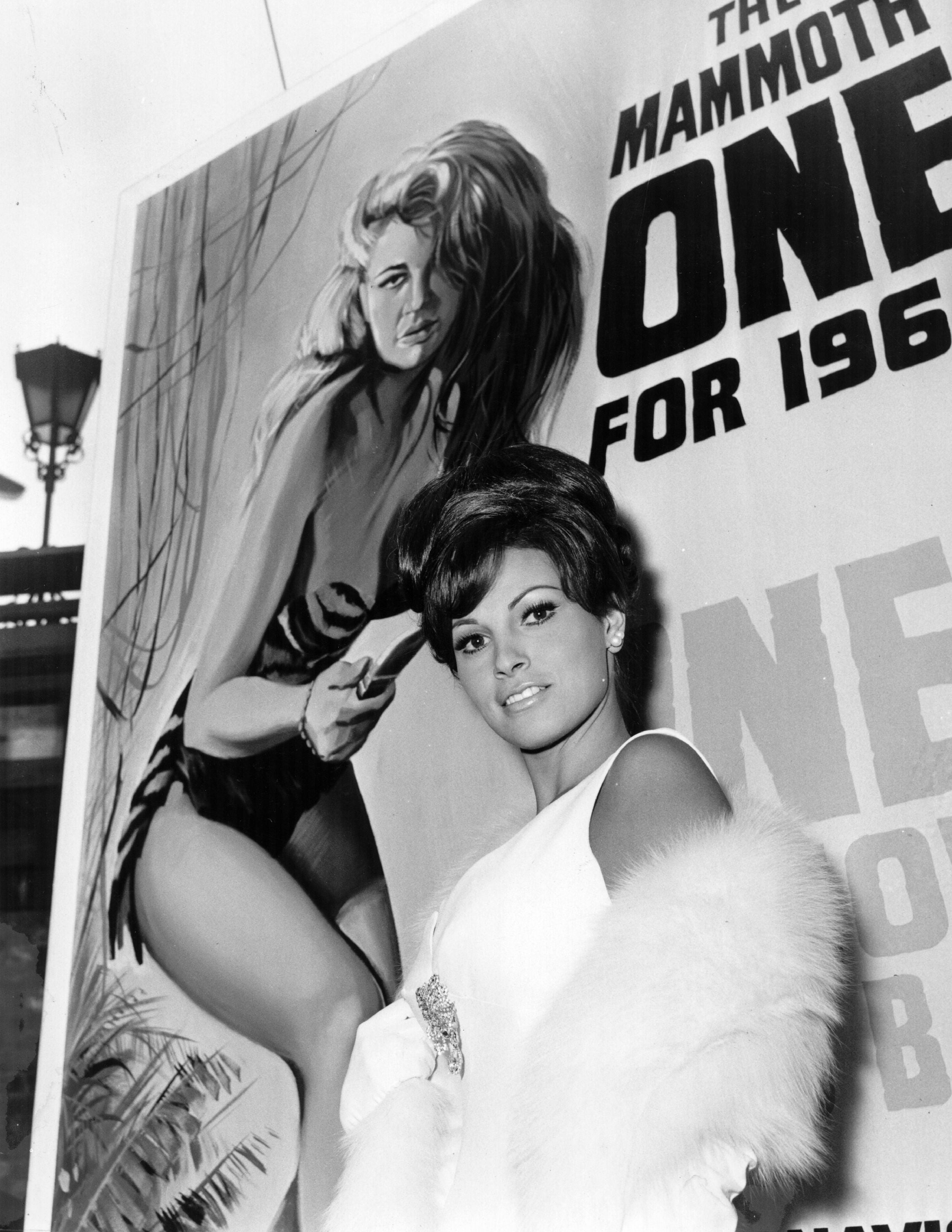Raquel Welch: Box-office bombshell who took Hollywood by storm
Her role in 1966’s ‘One Million Years BC’ catapulted her to stardom and led to a glittering career spanning five decades

Raquel Welch, who became an international sex symbol when she donned a deerskin bikini for the 1966 film One Million Years BC, and who went on to build a decades-long screen career while asserting and playfully winking at her dark-haired beauty, has died aged 82.
Welch, a one-time model and beauty queen, entered show business in decorous roles before making an impression in the 1966 science-fiction film Fantastic Voyage, playing a scientist who is shrunk to the size of a microbe and injected inside a dying man. Later that year, she starred as a cave-dwelling woman in One Million Years BC, a low-budget British adventure fantasy.
She hardly spoke in the film – in one scene, she was terrorised by a giant primordial bird – but few moviegoers bought tickets for the dialogue. Even before the film was released, a publicity photo emphasising her physical charms seemed to say it all. She wore a tattered, strategically placed animal skin that emphasised her legs, and gazed powerfully into the distance as her hair fell past her shoulders.
The picture instantly transformed her into a pinup star and box-office bombshell, launching her on a Hollywood career that spanned more than five decades and 70 film and television credits. “Nothing could look more alive and lasting than Miss Welch,” wrote New York Times reviewer Howard Thompson. The actor, he declared, was “a marvellous breathing monument to womankind”.
Welch went on to play one of the seven deadly sins – Lust, naturally – in the British comedy Bedazzled (1967) and was frequently cast in westerns in various states of undress, including as a frontier widow who falls in love with Dean Martin in Bandolero! (1968), a doomed Native American revolutionary opposite Jim Brown and Burt Reynolds in 100 Rifles (1969) and a gunfighter-in-training in Hannie Caulder (1971), with Robert Culp and Ernest Borgnine.
Many of her early films opened to bad reviews, including the comedy Myra Breckinridge (1970), based on a satirical novel by Gore Vidal, in which she played a transgender woman who claims to be her own widow. Looking back on the production, she told Out magazine in 2012, “the only good thing about that was the clothes”.
Still, she remained one of Hollywood’s most prominent leading ladies, appearing on the cover of Time magazine and continuing to search for better roles, even as some filmmakers seemed unable to see beyond her looks.
“I think there’s a stigma for glamorous actresses like [Marilyn] Monroe and [Jean] Harlow,” she told the Philadelphia Daily News in 1970. “They get the reputation of being empty and vapid. I see no reason why glamorous girls can’t be sensitive, intelligent and make something of herself. And, just as important, have that incorporated as being part of the image.”

Welch starred as a rugged queen of roller derby in Kansas City Bomber (1972) – she broke her wrist while speedskating in preparation for the film – and drew praise the next year for her supporting roles in The Three Musketeers, as Michael York’s love interest, and The Last of Sheila, opposite James Mason as a film actor who may have been involved in a murder.
Yet she also battled with co-stars and colleagues who called her a diva on the set. She said she threw a frying pan at Brown, the former Cleveland Browns fullback, while making 100 Rifles, and claimed she hired a bodyguard to protect her on The Last of Sheila, after director Herbert Ross allegedly struck her in the dressing room.
Mason called her “the most selfish, ill-mannered, inconsiderate actress that I’ve ever had the displeasure of working with”, according to a report in Newsweek.
“The more I learned, the more trouble I became,” she told the Scottish newspaper The Herald in 2001. “It was a period when I was making a big fuss about changing my image, trying to find the right thing and getting quite a lot of resistance. They thought they should humour me but I don’t think they really cared. On One Million Years BC, I’d go up to the director and say, ‘What if my character did this or that?’ He’d look at me and say, ‘Don’t think!’”

In 1980, Welch was fired from the film adaptation of John Steinbeck’s novel Cannery Row and replaced by Debra Winger, after the studio criticised Welch for insisting on doing her hair and makeup at home instead of on the set. She sued for breach of contract and was awarded $10m. “But since that time, I’ve never starred in a major motion picture,” she later told The Hollywood Reporter. “That’s not the outcome I was looking for.”
Venturing outside Hollywood for work, she found success on TV movies, notably with Michael Gross in the Emmy-nominated Right to Die (1987). She also appeared in a pair of Broadway musicals, earning praise for her performances in Woman of the Year and Victor/Victoria, and showed a flair for comedy in films including Legally Blonde (2001), in which she had a small role as a wealthy and comically neurotic widow. In 2010, she published a memoir, Raquel: Beyond the Cleavage.
“I refuse to apologise for what I do,” she had told the Miami Herald decades earlier, reflecting on her image. “Geraldine Page can’t do what I do, and the reverse is true. I will forever be the sexy lady, just as Julie Andrews will always be Mary Poppins. It follows you wherever you go.”
The first of three children, she was born Jo-Raquel Tejada in Chicago on 5 September 1940. Her father was a Bolivian-born aerospace engineer; her mother, an American with English ancestry, worked as an executive assistant at the toy maker Mattel.
Welch grew up in an unsettled home in the La Jolla section of San Diego, later recalling that her father had a sharp temper and often lashed out at her mother. “There was no cuddling or lovey-dovey stuff happening, even between Mom and Dad,” she wrote in her memoir. “I don’t recall ever seeing him kiss her or hold her hand. I was left hungry for a taste of tenderness and romance from an early age.”

Music over the radio seemed to soothe her mercurial father, and she said that she mostly sang along to keep him happy. He also took her to the movies, where Welch was enchanted by the elaborate costumes in films such as Laurence Olivier’s Hamlet and Prince of Foxes with Tyrone Power.
After staging plays in the family garage, where she used blue chenille bedspreads as curtains, Welch enrolled in classes at a local junior theatre. She also studied ballet and, as a teenager, entered beauty contests, eventually winning the Miss La Jolla, Miss San Diego and Maid of California titles.
Welch worked as a “weather girl” at a San Diego TV station and in 1959 married James Welch, her high school sweetheart. They had two children before separating, but Welch kept his last name while embarking on a career in show business, briefly working as a model in Dallas before moving to Los Angeles to act, including in the movie musical Roustabout (1964) with Elvis Presley.
By that time, she was in a relationship with press agent Patrick Curtis, who became her husband and business partner. When James Bond actress Ursula Andress passed on starring in One Million Years BC, Welch stepped in and put on her furs.
Her marriage to Curtis ended in divorce, as did subsequent marriages to French writer-producer Andre Weinfeld and restaurateur Richard Palmer. In addition to her son Damon, survivors include her daughter and a brother.
Decades after she posed for the publicity photo that launched her career, Welch had mixed feelings about seeing herself in a prehistoric bikini, at times hardly seeming to recognise the young woman at its centre. “Looking at ‘her’ now brings different emotions on different days,” she told The Herald. “Sometimes I go, ‘Ugh! Who is she?’ and other days I think, ‘Maybe there is something about that girl with her legs astride and hands at the ready that was kind of formidable’. Maybe, honestly, that is the essence of who I am.”
Brian Murphy, Michael S Rosenwald and Emily Langer contributed to this report
Raquel Welch, born 5 September 1940, died 15 February 2023
© The Washington Post


Join our commenting forum
Join thought-provoking conversations, follow other Independent readers and see their replies
Comments